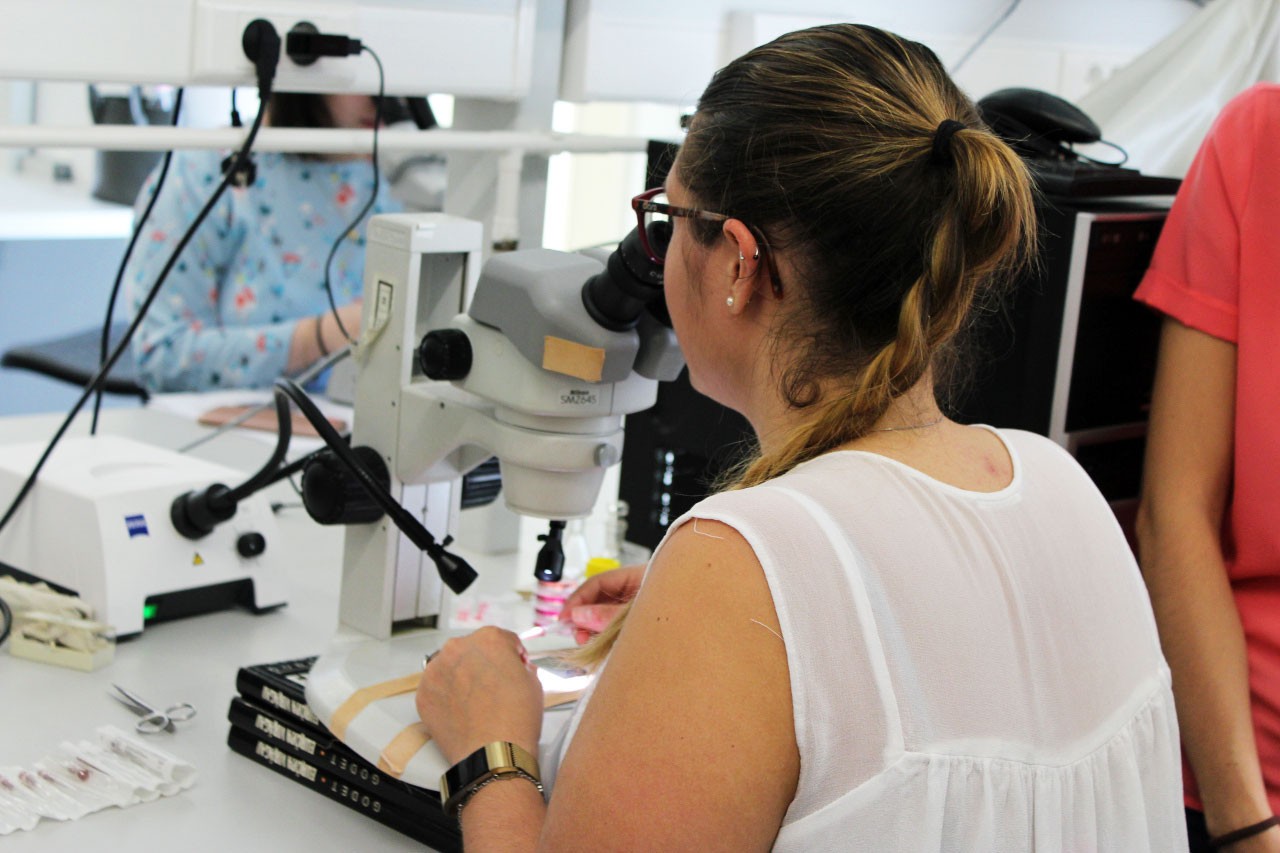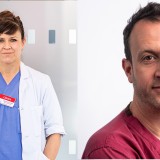
Our colleagues from GI research laboratories across Europe tell us about how the COVID-19 pandemic has changed their research, and how they have been dealing with the challenge.
We would love to hear about your own experiences, so please comment below with any additional tips!
Maciej Salaga, PhD
Department of Biochemistry, Medical University of Lodz, Poland
The recent outbreak of the COVID-19 pandemic has had a major impact on the work done in research laboratories. My group is working on new mechanisms that underlie the development and progression of IBD as well as on new pharmacological approaches for the treatment of this disorder. We use in vitro techniques, animal models and human samples obtained during endoscopies and surgical procedures performed in our University clinics.
In general, the work slowed down due to sanitary restrictions that kept the majority of the staff at home. Certain people could still come to the laboratory to carry out experiments and procedures that can be done in isolation, such as fluorescent microscope imaging or cell culture work. All of those require separate rooms and careful disinfection of equipment which, in case of cell culture work, is a standard procedure. Moreover, some in vivo experiments, especially those requiring animals of certain age which could not be rescheduled, were normally conducted to ensure the accuracy of the results. This unusual and unfortunate situation could, however, be beneficial for some researchers e.g. due to high availability of equipment that is usually booked several weeks in advance. Moreover, the majority of reagents and compounds needed for experiments were easily accessible for selected group of people who did not suspend their work. These people were able to stay very productive.
The obvious downside of COVID-19 restrictions was delayed delivery of materials, including consumables, chemicals and laboratory animals. All of these took either significantly more time or were not possible at all. One example could be the shipping of DNA purification reagents from Canada that was held in customs for 6 weeks before it could enter the EU.
Fortunately, researchers can also do quite a lot of work from home. Drafting manuscripts and research proposals as well as data analysis that does not require large CPUs can be easily done from the home office. This also includes administrative work, laboratory meetings, seminars and individual meetings with mentors.
In summary, this novel and unexpected situation taught us, and I hope we will come out of it unscathed.
Michał Żorniak MD; UEG Research Fellow Awardee
Diseases of the Pancreas Group, Ludwig-Maximilian's University Munich, Germany
Simon Sirtl MD
Clinician, Resident at Department of Medicine II, University Hospital, Ludwig-Maximilian's University Munich, Germany
The pandemic of COVID-19 has had and still has a dramatic influence on the social, economic, and healthcare aspects of everyday life worldwide. Obviously, it has also affected daily routine in basic and clinical research. These extraordinary circumstances are challenging for our Diseases of the Pancreas Research Group (PI: Prof. Julia Mayerle) at LMU Munich during the realisation of my UEG Research Fellowship entitled: "Role of microlithiasis-induced NLRP3-inflammasome activation in the development of acute pancreatitis". As our project combines aspects of in vitro, in vivo, and clinical research, we were forced to modify the workflow between laboratory and medical departments. Munich and the southern part of Germany were declared as one of the most affected areas by the pandemic (ca. 20% of the cases nationwide). That is why a number of strict but necessary solutions were implemented, obviously changing the functioning of Ludwig-Maximilian's University Hospital as well as its research facilities. Local strategies aimed to test and separate the most significant possible number of infected patients.
Accordingly, patients with confirmed or suspected COVID-19, used separated emergency departments, travel routes, and wards inside the hospital. In consequence, we temporarily stopped the transfer of tissue samples acquired from patients in endoscopy units involved in the study (two clinical centers in Poland and LMU Munich) for research purposes. As the pandemic situation became more stable, we have carefully returned to the collection of necessary material, following local epidemiological rules. To keep the laboratory-based scientific workflow as efficient and safe as possible, we have implemented several security measures. This included limitations of laboratory worktime to the essential minimum, social distancing in the workplace, and obligatory use of personal protective equipment. Following the mentioned rules has allowed us to continue research projects despite pandemic.
Moreover, our clinical ward (Department of Medicine II) was mainly involved in this reorganisational process by deploying medical stuff to the central COVID-19 task force. Basic researchers were also involved in this special task force analysing newly published available data at the early stages of the COVID-19 pandemic. Despite its effect on everyday work in the field of Science, the pandemic has shown us that strict collaboration between clinical and basic scientists allows us to adapt to these new circumstances.
Tsvetelina Velikova, MD, PhD, Specialist in Clinical Immunology
University Hospital Lozenetz, Medical faculty – Sofia University "St. Kliment Ohridski", Sofia, Bulgaria
As a clinical immunologist, working in the field of gastroenterology, the current pandemic has changed some of my routine and research work.
First of all, our routine diagnostic work at the laboratory has decreased due to the lack of enough patients. Our GI colleagues and partners who send us patients, also observed a decrease in the number of visiting patients with digestive complaints. Although we all still take the mandatory measurements for the protection of ourselves and our patients, the patients are still afraid of going to hospitals.
My research practice has also faced some challenges. We were about to start two small trials with probiotic use in healthy people and patients, mainly with IBS. However, due to the pandemic, it was not possible to start such initiatives. Other planned GI projects, i.e. comparing different methods and kits for measuring fecal calprotectin, have been postponed until autumn in hope of the pandemic been less severe by then.
In our lab, although immunological, we have decided not to turn to COVID diagnostic testing or research. In line with this, we have struggled to keep our routine diagnostic, research, and teaching activity. Moreover, we had to adapt to the coronavirus pandemic quickly. We could not switch to working from home. However, we used our time well during the lockdown, finishing those articles usually postponed. I have managed to finish and publish two relevant articles, which was more than fruitful for my academic career.
Marta Bento Afonso, PharmD, PhD, Post-Doctoral Researcher
Research Institute for Medicines (iMed. ULisboa), Faculty of Pharmacy, UIniversidade de Lisboa, Lisbon, Portugal
Portugal combines one of the world’s highest percentage of people over 65 with the fewest intensive care beds per people in Europe; whereby, the prospects for the consequences of the novel coronavirus pandemic in our country were not the best. However, fortunately, Portugal government introduced a swift set of measures to contain the spread of the virus, including an early lockdown, and extensive diagnostic testing for COVID-19, which altogether were translated in a relative success in fighting back the virus. Importantly, Portuguese research centres have combined efforts to develop COVID-19 diagnostic tests, thus contributing to increase the country's testing capacity. For instance, my research unit has developed a protocol for COVID-19 diagnosis, which was accredited by the Portuguese health authorities, and assembled a team of volunteers performing 750 tests/day since the end of March.
Still, although several research teams were redirected to face COVID-19 scientific, treatment and diagnostic challenges, we cannot ignore that other research projects dependent on bench work may have been in some way delayed or temporarily suspended during the lockdown. But here I see the glass half-full: many researchers took advantage of this period to speed up the writing and publication of original research articles and reviews, read and analyze data with a new perspective and in a more focused way. In that sense, the scientific quality of the ongoing projects was not impaired. In Portugal, the mandatory isolation also coincided with a Portuguese governmental call for research projects; so, it was a time for many researchers to calibrate their research compass by preparing and submitting new research proposals.
However, I recognize that one of the main hitches may have been maintaining mental health and motivation in a global apprehension environment and physically away from family and friends. Social distancing is particularly disturbing for Portuguese people. In my case, my sanity was kept during the quarantine, in part, because I was busy in almost all of the above fronts - I have submitted a manuscript, as well as a grant application, while also being technically involved in COVID-19 diagnosis as a volunteer. For others, it may also have been challenging to keep the focus working from home and be productive while also supporting their children, given that kindergartens and schools were closed, and teaching was switched to online classes and “teleschool” (classes transmitted on public TV).
Portugal is now on the gradual easing of the lockdown restrictions. Research Institutes already re-started their activities by implementing general workplace preventive measures, including physical distancing, mandatory face masks, and strict adherence to sanitization measures, while also testing the staff for SARS-Cov-2 presence and antibodies. The transition out of lockdown is set to be a complex and uncertain phase, being difficult to predict how the pandemic will evolve and if a more devasting second spike of COVID-19 cases is in the horizon. Further, the consequences of the pandemic in the vulnerable Portuguese economy is also a major concern. Thus, it is hard to know if the worst is over. Knowing that “It is not the strongest who will survive, but those who can best manage change”, I hope that we can adapt to all of these challenges to get our “normal” lives back. Moving forward, I hope that as a global society we all keep two reinforced certainties: It is all about Life/Love… and Science matters!
Helena Dauvarte, MD
Resident in gastroenterology
North Estonia Medical Centre
The COVID-19 pandemic has affected the whole world very severely, including Estonia. Not only stationary and ambulatory work were influenced, but also scientific research had to be done according to the new requirements. At this point, I am not doing research myself, but I can see how the changes introduced in the Hospital could affect it.
Because Hospitals are a suitable place for prospective research, I believe this can be really influenced. Ambulatory patients were administered through a telephone call, which prevented from a detailed patient examination and may affect research by postponing some data analysis. Not to mention, monitoring patients and collecting data virtually can be quite challenging. Similarly, there were changes in endoscopy planning. Ambulatory procedures were postponed which might influence patient responsiveness to further examinations.
Regarding cancelled conferences, a lot of research work will not be presented as planned. Even though some conferences are held online, the responsiveness from doctors is lower than usual. This is because many doctors choose not to take a day off for an online event, rather they choose to stay at work and listen to conferences at some free moments. This is unfortunate because I believe the outcome of an on-spot event would have much more influence.
On a positive note, I believe there will be a mayor increase in case reports and research focused on patients infected with the virus. In gastroenterology, for example, it is quite challenging to treat patients with IBD or who are on a waiting list for a liver transplantation and are infected with COVID-19. This opens doors for new guidelines and treatment plans, which play a major role in research.
I believe now many health conditions will be viewed from a different perspective. The fast spread of the virus might be a motivating factor to do research on this field as fast as possible and in as many aspects as possible.




Please log in with your myUEG account to post comments.